Англ. Essential Business English Practice (магистрат. Практикум по основам делового общения на английском языке учебное пособие
 Скачать 6.36 Mb. Скачать 6.36 Mb.
|
|
IN-FLIGHT MEALS 4. Here’s a conversation you might have on the plane: Flight attendant: Fish, chicken or vegetarian? Y  ou: What’s the fish? ou: What’s the fish?Flight attendant: It’s tuna. You: Chicken, please. Flight attendant: Anything to drink? You: Yes. Water, please. Flight attendant: Still or sparkling? You: Still, please. Flight attendant: Here you go. Enjoy your meal. You: Thanks. Study the menu below and order a meal or a drink. If you didn’t understand what the flight attendant said, you can say ‘Sorry?’ Or ‘Pardon?’ to ask him or her to repeat it. If you want to ask for something, you can use the phrase ‘Can (Could) I have…’
5. Read the dialogue. Flight attendant: Would you like something to drink? You: Could I have Coke with no ice? Flight attendant: Here you are. Please fill in this form before the plane lands. You: What is this form for? Flight attendant: It’s a Customs and Immigration form. You will use that in the airport before you can enter the country. Now you fill in the UK landing card. 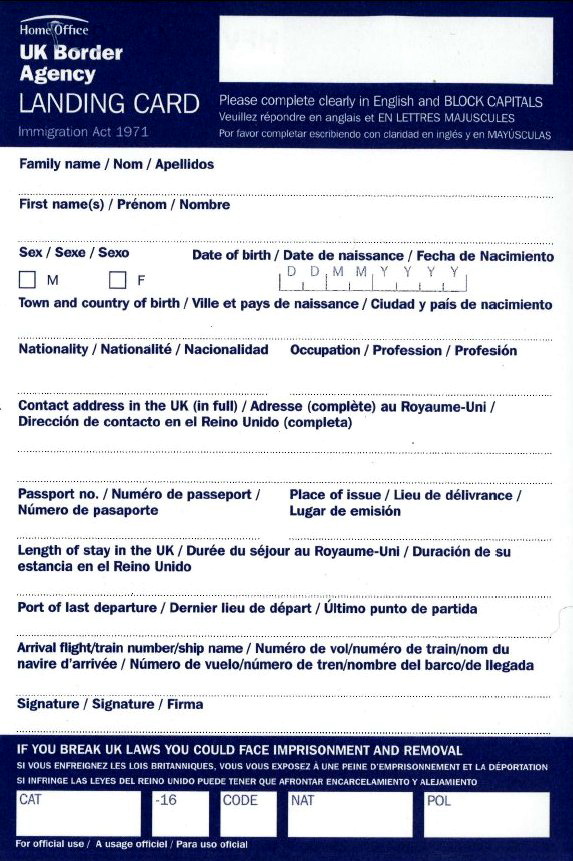 You can also practise filling in the I-94 form for visitors to the USA. 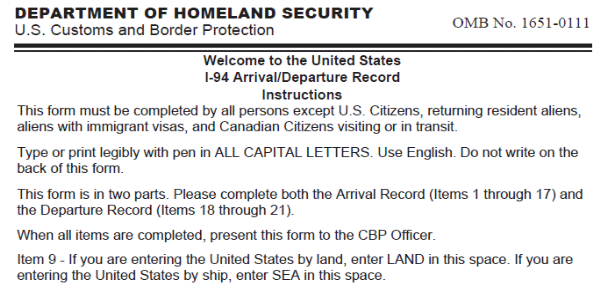 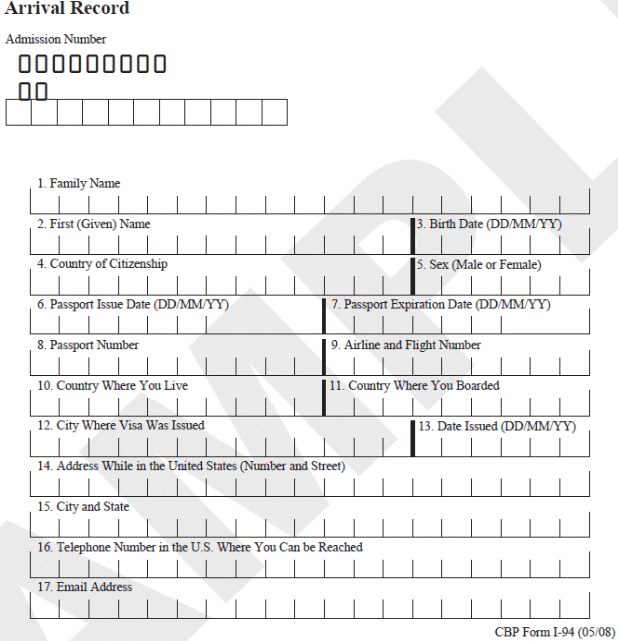 PASSPORT CONTROL & CUSTOMS ‘The World is a book, and those who do not travel read only a page.’ St. Augustine (354 – 430), Christian theologian and philosopher 1. Answer the questions. Is it important to have customs at international borders? Why / why not? What kind of items do people try to smuggle? Could more be done to stop smugglers? 2. Remember the following words and expressions. entry /exit /tourist(travel) /student visa – въездная /выездная /туристическая /студенческая виза to extend /renew /grant /deny (refuse) a visa – продлить /возобновить /предоставить /отказать в визе to put a visa on a passport – проставить визу в паспорте to enter a country on a visa – въехать в страну по визе customs house – таможня customs officer – таможенник customs tariffs / fees – таможенные тарифы / сборы customs clearing – таможенный досмотр to go through the customs – пройти таможенный досмотр You must be cleared by the customs. – Вы должны пройти таможенный досмотр. customs declaration – таможенная декларация to fill in a customs declaration – заполнить таможенную декларацию to be liable to duty / duty free – подлежать / не подлежать обложению пошлиной Are these items /things liable to duty? - Эти вещи облагаются пошлиной? Do I have to pay a duty on this item? - Надо ли мне платить пошлину на этот товар? free of charge / free – бесплатно prohibited items (articles) - запрещенные для ввоза и вывоза товары duty-free quota list – список предметов, разрешенных к беспошлинному провозу duty-free – не подлежащий обложению таможенными пошлинами to fall under restrictions – попадать под ограничение the normal allowance – разрешенные предметы personal belongings – личные вещи to stay at a hotel– остановиться в гостинице to go through the red / green channel – идти через красный / зеленый коридор How long are you going to stay in the country? – Как долго вы собираетесь оставаться в стране? Do you have anything to declare? – У вас есть вещи подлежащие декларированию? What’s the nature /the purpose of your visit? – Какова цель вашего визита? 3. Translate the following into English using the active vocabulary from ex.2. Я прошел таможенный досмотр, и таможенник поставил мне въездную визу в паспорте. Если у вас есть вещи, которые подлежат обложению пошлиной, заполните таможенную декларацию. Если я продлю мою студенческую визу, я смогу въехать в Испанию по этой визе. В прошлый раз он пытался провести в страну запрещенные для ввоза товары и после этого ему отказали в выдаче новой визы. Среди моих личных вещей были товары, которые попадает под ограничение, и мне пришлось заплатить таможенный сбор и пойти через красный коридор. Вам нужно пройти таможенный досмотр на таможне, даже если у Вас при себе только разрешенные для ввоза и вывоза предметы и личные вещи. Где мне можно найти список предметов, разрешенных к беспошлинному провозу? – Спросите у таможенника, который продлевает визы. Мне нужно платить пошлину на этот товар? – Да, такие предметы облагается пошлиной. При въезде в страну вам в паспорт ставят въездную визу, а при выезде из страны сотрудник таможенной службы проставляет в Вашем паспорте выездную визу. Я не знаю, есть ли эти предметы в списке разрешенных к беспошлинному провозу. 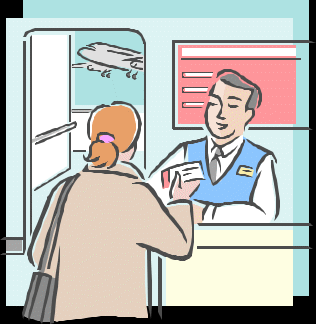 4. Study the dialogue. At Passport Control Immigration officer: Good evening. Where have you come from? Traveller: Moscow, Russia. Immigration officer: May I have your passport and form I-94, please? Traveller: Here you are. Immigration officer: What’s the nature of your visit? Business or pleasure? Traveller: Pleasure. I’m visiting my relatives. Immigration officer: How long are you going to stay in the United States? Traveller: Three weeks. Immigration officer: Have you ever been to the United States? Traveller: No, it’s my first visit. Immigration officer: What is your occupation? Traveller: I work as an accountant for a Russian chemical company. Immigration officer: Do you have a return ticket? Traveller: Yes, here it is. Immigration officer: That’s fine. Thanks. Enjoy your trip. Traveller: Thank you. Now translate the following into English and role-play the situation. Use ex.4 as a model. Student A (Immigration officer)
Student B (Traveller)
5. Role-play the conversation ‘At Passport Control’ using the prompts below. Beijing, China / holiday / three days / a sales manager for a petrochemical company Paris, France / to study English / 3 months / a student at college Osaka, Japan / business conference / 2 weeks / CEO, Buy&Sell Co. Warsaw, Poland / to visit relatives / a month / a sales representative Athens, Greece / business trip / 2 months / a lawyer Ottawa, Canada / to visit a business partner / 5 days / a production manager Rome, Italy / business trip / 2 weeks / a driller in a gas company Deli, India / to study English / 5 weeks / a technician in a big oil company Barcelona, Spain / business trip / 24 hours / an operator at a refinery 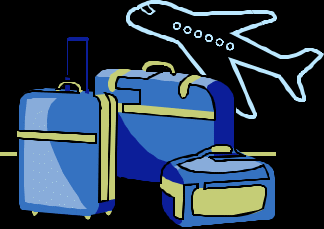 6. Study the conversation. At Customs Customs officer: May I look at your passport and customs declaration form, sir? Traveller: Certainly. Here you are. Customs officer: Do you have anything to declare? Traveller: No, nothing. Just the normal allowance. Customs officer: What do you have in this suitcase? Traveller: Books, clothes, personal belongings and a bottle of wine. Customs officer: Okay, do you have anything else besides these? Traveller: No, I don’t. Customs officer: How much money do you have on you? Traveller: I have four thousand US dollars and eight hundred euros. Customs officer: That’s fine, thank you. You can proceed. Have a nice stay in the United States. T  raveller: Thank you. I’m sure I will. raveller: Thank you. I’m sure I will.Now translate the following into English and role-play the situation. Use ex.6 as a model. Student A (Customs officer)
Student B (Traveller)
7. Role-play the conversation ‘At Customs’ using the prompts below. |
